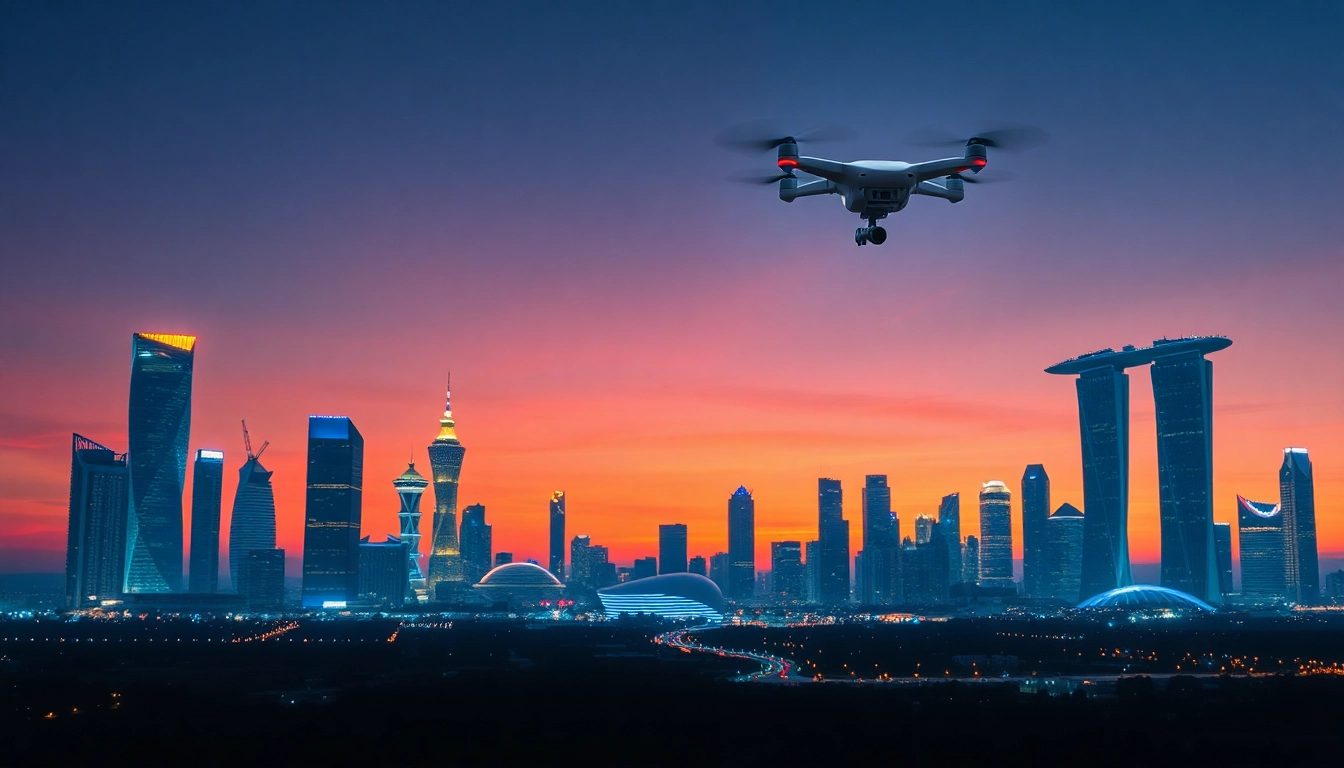Understanding Technology: Definitions and Implications
What is Technology?
Technology is a broad term that encompasses the tools, machines, and systems that humans create to solve problems and improve life. Essentially, it represents the application of scientific and mathematical knowledge for practical purposes. According to technology experts, this field does not just cover innovations in communication, computing, and engineering, but also the methodologies and processes that bring them to fruition.
From the earliest stone tools to today’s sophisticated artificial intelligence systems, technology continues to evolve, shaping every aspect of our existence. The meaning of technology is varied, but it fundamentally remains the use of knowledge to create value and efficiency in our daily lives.
The Historical Evolution of Technology
The history of technology spans thousands of years and is a reflection of human advancement. Beginning with simple stone tools, the journey of technology incorporates significant milestones like the invention of the wheel, the printing press, and the steam engine, which marked transitions from primitive societies to industrialized nations.
Each era signified a leap forward, but the most pivotal changes came in the 20th and 21st centuries with the advent of computers and the internet. These innovations have not only revolutionized how we communicate and access information but have also fostered globalization.
In the modern era, technologies like mobile computing, quantum computing, and renewable energies continue to push boundaries, suggesting that the evolution of technology is unceasing, and its impact is profound on culture, economy, and the environment.
Types of Technology and Their Impact
Understanding the different types of technology enhances our appreciation for how they affect our lives. Broadly, technology can be categorized into various types, including:
- Information Technology: This encompasses computer systems, software, and the internet. It thrives on data management and communication, facilitating tasks from personal budgeting to global information sharing.
- Biomedical Technology: Innovations in this field improve healthcare, including diagnostic equipment, medical devices, and telemedicine solutions that expand access to quality care.
- Consumer Technology: Devices like smartphones, smart TVs, and home automation systems enhance personal convenience and entertainment.
- Industrial Technology: This includes automation, robotics, and production optimization processes that boost efficiency in manufacturing.
Each type has distinct implications for society, often serving as catalysts for economic development, improved quality of life, and enhanced workplace productivity.
Current Trends in Technology
Artificial Intelligence: Driving Change
Artificial Intelligence (AI) is arguably the most transformative technology today. Its ability to learn from data and improve over time has led to innovations in sectors ranging from healthcare to finance. AI applications such as machine learning, natural language processing, and autonomous vehicles are reshaping industries.
AI-powered systems can analyze vast data sets quickly, leading to enhanced decision-making and predictive analytics. For example, in healthcare, AI can assist in diagnosing diseases and suggesting treatments based on patient data, while in finance, AI algorithms detect fraudulent transactions in real time.
The potential of AI is enormous, with predictions suggesting that it could contribute up to $15.7 trillion to the global economy by 2030. However, it raises ethical concerns around job displacement and bias, necessitating ongoing dialogue and regulatory frameworks.
Blockchain Technology: Beyond Cryptocurrency
Blockchain technology is often associated with cryptocurrencies like Bitcoin, yet its utility extends far beyond financial transactions. A blockchain is a decentralized ledger that securely records and verifies information across a network, minimizing the risk of fraud.
This technology can enhance transparency in supply chains, allowing companies to track the provenance of goods and ensure authenticity. Moreover, its smart contracts automate processes, reducing the need for intermediaries.
Various industries, from real estate to healthcare, are exploring blockchain for its potential to streamline operations and enhance trust. As blockchain technology matures, it’s likely to redefine how we approach record-keeping and contractual agreements.
The Rise of Internet of Things (IoT)
The Internet of Things (IoT) refers to the connectivity of everyday objects to the internet, enabling them to send and receive data. This allows for smarter environments, characterized by interconnected devices that enhance user experiences.
Smart cities are a prime example of IoT’s impact, utilizing sensors to manage resources efficiently and improve quality of life. From traffic management to energy consumption, IoT can lead to significant enhancements in urban living.
The consumer market is also witnessing IoT growth, with smart home devices, wearables, and connected appliances becoming ubiquitous. These technologies provide convenience and efficiency, helping consumers track spending, manage energy use, and enhance security.
Challenges and Ethical Considerations in Technology
Privacy Concerns in a Digital Age
The digital age brings unprecedented convenience, but it also entails privacy concerns as data breaches and misuse of personal information are common. With the increasing reliance on technology, individuals are often vulnerable to data harvesting and surveillance.
Organizations must prioritize cybersecurity measures, ensuring that customer data is protected against unauthorized access. Additionally, regulations such as the General Data Protection Regulation (GDPR) in Europe emphasize the need for companies to be transparent about how they collect and process data.
Ultimately, a balance must be struck between leveraging data for innovation and respecting individual rights to privacy.
Technology and Job Displacement
While technology can drive efficiency and economic growth, it also poses a risk of job displacement. As automation and AI take over tasks traditionally performed by humans, many fear significant job losses across industries.
However, history shows that technological advancement has generally led to the creation of new jobs, albeit requiring a different skill set. The focus must be on retraining and upskilling workers to prepare them for future employment opportunities in emerging industries.
Governments and organizations must collaborate to develop educational programs and workforce strategies that help workers transition into new roles created by technology.
Environmental Impacts of Technology
The rapid pace of technological advancement brings environmental concerns, particularly regarding the resources consumed and waste generated by electronic devices. E-waste poses a significant issue, as improper disposal can lead to toxic pollution and harm to ecosystems.
To combat these impacts, technologies such as energy-efficient devices and renewable energy sources are critical. Furthermore, initiatives focused on recycling and sustainable production processes are essential to ensuring technology contributes positively to environmental goals.
Implementing Technology in Everyday Life
Smart Home Innovations: Making Life Easier
Smart home technology has revolutionized how we interact with our living spaces, providing convenience and energy efficiency. Home automation systems enable users to control lighting, temperature, and security through their smartphones or voice commands.
Devices like smart thermostats optimize heating and cooling, leading to reduced energy bills. Additionally, smart security systems provide peace of mind by allowing homeowners to monitor their properties remotely, with alerts for unusual activity.
Implementing these technologies can lead not only to improved comfort but also to significant savings and a reduced carbon footprint.
Wearable Technology: Tracking Health and Fitness
Wearable technology, from fitness trackers to smartwatches, has gained popularity for their ability to assist individuals in monitoring health and wellness. These devices collect data on physical activity, heart rate, and sleep patterns, providing valuable insights into personal health.
Healthcare providers can leverage wearable technology to enhance patient care. With continuous monitoring, they can gain a holistic view of a patient’s health, leading to more informed decisions and timely interventions.
The integration of wearables into daily life encourages individuals to take a proactive approach to their health, ultimately contributing to improved outcomes.
EdTech: Transforming Education for Future Generations
Education technology (EdTech) is reshaping the learning landscape, making education more accessible and personalized. Online learning platforms, e-books, and interactive tools have transformed traditional teaching methods, fostering engagement and collaboration among students.
Remote learning, accelerated by the COVID-19 pandemic, highlighted the importance of digital skills in education. As schools and educators embrace technology, they can tailor learning experiences to accommodate diverse learning styles and needs.
Moreover, the data obtained from EdTech applications can help educators identify areas of improvement, ensuring that educational practices adapt to meet the demands of future generations.
The Future of Technology: Predictions and Insights
Emerging Technologies to Watch
As we look to the future, several emerging technologies promise to further transform our world. Noteworthy among these are:
- Augmented Reality (AR) and Virtual Reality (VR): As AR and VR technology advances, they’re expected to revolutionize industries like gaming, retail, and education by providing immersive experiences.
- Quantum Computing: This groundbreaking technology has the potential to solve complex problems at speeds currently unattainable by traditional computers, impacting fields such as cryptography and medicine.
- 5G Technology: The rollout of 5G networks will enhance connectivity, enabling smarter cities and more efficient IoT implementations.
How Technology Will Shape Our Societies
Technology continues to influence societal structures, altering how we communicate, work, and interact. As we embrace a tech-driven world, significant societal changes deserve attention, such as the increasing importance of digital literacy, access to technology, and ethical considerations around AI and privacy.
Moreover, technology can either bridge or widen socioeconomic divides. Ensuring equitable access to digital resources is crucial for fostering inclusive growth and preventing disparities.
Preparing for a Tech-Savvy Future
In light of rapid technological advancements, preparation for a tech-savvy future is imperative. This involves rethinking education, workforce development, and policy-making. Lifelong learning must be embraced, with a focus on fostering skills that align with future opportunities.
Moreover, as technology becomes more ingrained in our lives, ethical considerations must guide its implementation. Governments, businesses, and academia should collaborate to craft regulations that promote responsible tech use while fostering innovation.
Ultimately, a proactive approach to technology will ensure that it serves as a force for good, enhancing lives while addressing the complex challenges of our time.



